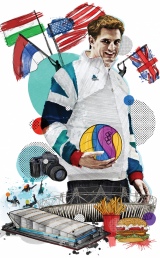Campus life: PhD student and Olympic water polo player Adam Scholefield

For an Olympian the routine becomes extraordinary, says PhD student Adam Scholefield (Electrical and Electronic Engineering 2007).
The GB kit slowed me down, out of the water. Each journey I made during the Olympic fortnight meant people jostling, snapping photos and grilling me about my sport. No-one knew my name but there was instant celebrity status in wearing this blue-white-blue version of the Union flag.
Many athletes chose to give the opening ceremony a miss, put off by its length, but walking round the track of the blazing stadium, I wouldn’t have been anywhere else. The invisible crowd made the most amazing noise. Country boundaries were dissolved as the athletes were drawn into a massive circle, singing the lyrics: “Na na na, na-na na na, Na-na na na, hey Jude”. We were in this together, fired up to be the best we could possibly be.
When the news came in December 2011 that, for the first time since 1956, Great Britain would compete in water polo, I was quietly confident I’d be put forward for London 2012. I was vice captain of the GB national team and for two years I’d put my PhD studies on hold to play for the professional club PVSK in Hungary. Over that time my fingers had been wrinkly for at least four hours a day as I honed my techniques in the water, and gym sessions were almost as regular as mealtimes.
During the Games, the training routines I’d done for years became extraordinary. Stretching alongside multiple medalwinning swimmer Michael Phelps was surreal – my consolation for failing to coincide with the synchro team, which was the goal on training days.

The cheers as we lined up to go out for our first match were crazy and generated extreme nerves. We were the youngest water polo team at the Olympics, competing against players from countries where kids grow up watching matches on TV and long for the stardom attached to the sport. We were also in the ‘Group of Death’, alongside Hungary, the US and Serbia, the respective winners of gold, silver and bronze in Beijing 2008.
While we felt under immense pressure, there was no space for anxiety in our play. We were solid in some games, but made frustrating mistakes. The unwavering support we encountered across all our matches made five successive defeats easier to taste. Even when we were behind and the crowds could have been critical of us, their roars continued.
In a host country unfamiliar with the ins and outs of water polo, the media latched on to the sport’s unsporting side. Players know the unwritten rules of the game and accept that no part of the anatomy is safe underwater. Beneath the surface you can’t be seen so if you put your head down there, you are going to get hit. While the cameras zoomed in on any blood spilt and the crowds appeared shocked, punches, kicks and grabs are everyday occurrences in the world of water polo – Olympic matches were no different.
For many athletes who had spent years perfecting their physique, a burger and fries at sunrise brought down the curtain on their Olympic performance. As I joined the McDonalds party at 05.00 after a night of celebrations, I broke a cycle that has been my life for so long. It’s been hard, as I love my sport, but the pause has given me time to focus on my PhD – I now spend 14 hours a day absorbed by imaging techniques.
Before the Olympics my supervisor would say I should be looking for a real job. Now, having watched me in London, he’s pushing me to play more water polo. Whether in a place in the 2014 Water Polo European Championships or in a position in academia or a tech company, I’ll be immersing myself fully in whatever comes next.
Based on an interview with ADAM SCHOLEFIELD (Electrical and Electronic Engineering 2007) who is studying for a PhD in imaging processing.
This article first appeared in Imperial Magazine, Issue 38. You can view and download a whole copy of the magazine, from www.imperial.ac.uk/imperialmagazine.
Article text (excluding photos or graphics) © Imperial College London.
Photos and graphics subject to third party copyright used with permission or © Imperial College London.
Reporter
Press Office
Communications and Public Affairs
- Email: press.office@imperial.ac.uk
